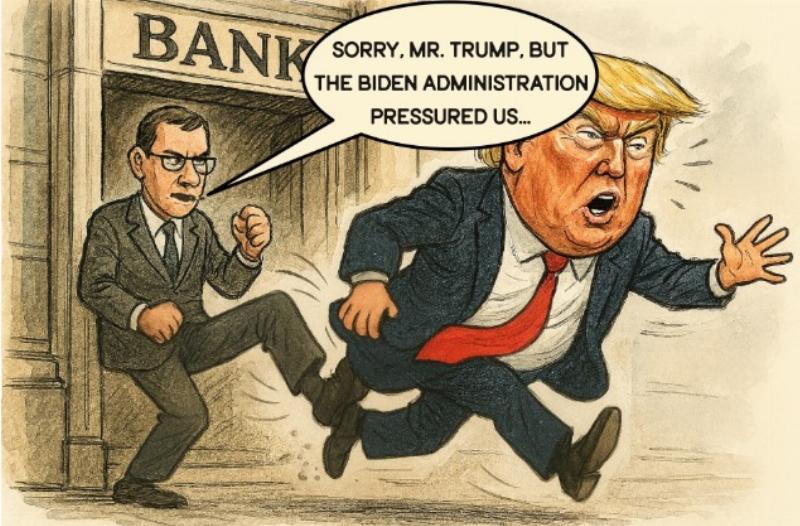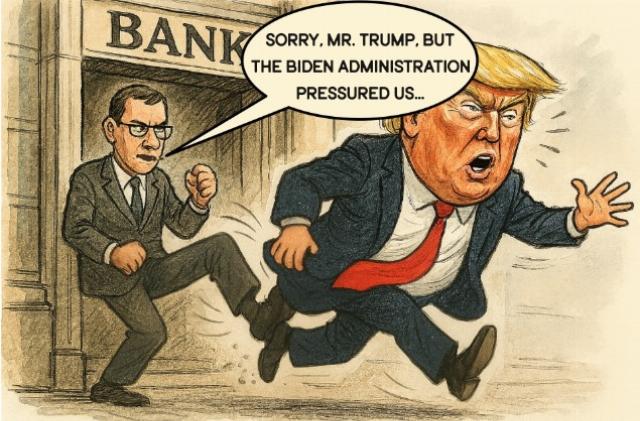


In the West, we keep our money in banks, not under mattresses or wall safes. Banks are safe and convenient, and they pay us interest on the money we store with them, because they then lend that money out and make a profit by charging interest to borrowers. That’s a good thing, as Jimmy Stewart explained in It’s a Wonderful Life. What helps power our economy is that we essentially loan our money to banks so that they can loan it to others who, in turn, can invest in the small business infrastructure that makes America grow.
When dictators wish to destroy people so that they are unable to function in modern society, they deny them access to banking. Canada did that to the truckers who protested that country’s insane COVID regime. In China, the social credit system that monitors whether people are faithfully observing government policies punishes those who fall afoul of the system by denying them access to banking.

Image created using AI.
And of course, in America, “woke” banks have “debanked” conservatives, both individuals and businesses. There was, of course, the push to debank gun manufacturers and sellers, even though the right to bear arms is a core part of the Bill of Rights. Thus, Citigroup, Bank of America, and JPMorgan, just to name a few, enacted policies targeting gun retailers and manufacturers, especially those associated with AR-15s, the most popular firearm in America.
Several conservative Christian organizations have claimed that they’ve been debanked, but the banks have insisted that the problems were that the groups just weren’t good business. (See, e.g., here, here, and here.) JPMorgan Chase refused ticket payment processing for the Defense of Liberty organization on viewpoint grounds, but then backed off when the Missouri treasurer pushed back. Individuals who claim to have been debanked include Nigel Farage, Enrique Tarrio (debanked long before January 6), Laura Loomer, Joe Biggs, Martina Markot, and Gina Miller.
One could say that these are just random examples, and the banks did, in fact, invariably have justifications for their decisions. However, there was nothing random about what happened to Donald and Melania Trump.
It recently emerged that being a multi-billionaire former president of the United States will not protect you from debanking. What’s horrific about the attack on Donald and Melania Trump’s ability to engage in normal banking commerce is that the push came from the Biden administration. Banks weren’t being stupid; our government was being tyrannical.
The first news was that the Trumps got the boot from JPMorgan and Bank of America. However, according to Charles Gasparino, the pressure to deny the former first couple access to banking extended far beyond those two banks:
Under pressure from the Biden administration, just after Trump lost the 2020 election and started to act out (which the last time I checked was his constitutional right), the enforcement of reputational risk took a decidedly political turn, bank officials tell me.
If you believe people at the two largest banks, Jamie Dimon’s JPMorgan and Brian Moynihan’s BofA, the Biden administration unleashed its bank regulatory cops at the Office of Comptroller of Currency, the FDIC and the semi-independent Federal Reserve to go beyond nixing perverted financiers from their platform.
They used the amorphous nature of what is reputational risk to enforce a political regime, the bank officials said.
The Bidenistas hated crypto, thought it was an affront to their power to control the economy, and pressured banks from doing business with this somewhat heterodox emerging industry, according to the bank sources.
So was anything related to guns and certain conservative religious organizations, they added.
And most of all, anything MAGA, including the multibillion-dollar real estate and resort empire of Mr. MAGA himself, Donald J. Trump.
While the pressure was subtle—no smoking gun memos—the regulatory “reputational” heat was so great that banks just decided it was easier to jettison the former president’s business than to deal with bank regulators.
As Gasparino warns, this kind of subtle regulatory pressure should frighten all of us because, “if any big bank can cancel a former president over politics as opposed to illegality, then every American citizen is in danger of facing the same mistreatment.”
